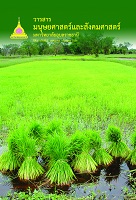องค์ความรู้และภูมิปัญญาท้องถิ่นของชุมชนบ้านดอนหมู ชุมชนบ้านตำแย ชุมชนราชธานีอโศก และชุมชนฝึกฝนเศรษฐกิจพอเพียง จังหวัดอุบลราชธานี
Main Article Content
บทคัดย่อ
ปัจจุบันชุมชนทั่วไปมีปัญหาทางด้านเศรษฐกิจ คุณธรรม จริยธรรม สุขภาพ วิถีชีวิตสิ่งแวดล้อม สาเหตุสำคัญประการหนึ่งคือ การละเลยองค์ความรู้และภูมิปัญญาท้องถิ่น ซึ่งเป็นทุนทางปัญญาที่มีอยู่ในชุมชน จากการศึกษา 4 ชุมชนในจังหวัดอุบลราชธานี ที่มีระดับความเคร่งครัดในด้านศีลธรรม คุณธรรมจริยธรรมเรียงจากมากไปหาน้อยตามลำดับ คือชุมชนราชธานีอโศก ชุมชนฝึกฝนเศรษฐกิจพอเพียง อำเภอวารินชำราบ ชุมชนบ้านดอนหมู อำเภอตระการพืชผล และชุมชนบ้านตำแย อำเภอม่วงสามสิบ โดยการสำรวจข้อมูลจากแบบสอบถาม การสัมภาษณ์และการสังเกต พบว่า ความรู้และภูมิปัญญาท้องถิ่นมีดังนี้ ชุมชนบ้านดอนหมูและชุมชนบ้านตำแย เริ่มต้นที่การรับรู้ปัญหาแล้วรวมตัวกันของชาวบ้านทำกิจกรรมชุมชน จนสามารถพึ่งตนเอง ชุมชนราชธานีอโศก และชุมชนฝึกฝนเศรษฐกิจพอเพียง เป็นชุมชนชาวอโศก ชาวชุมชนมุ่งเน้นการถือศีลปฏิบัติธรรม เสียสละให้สังคม อยู่กันแบบเอื้อเฟื้อเกื้อกูลแบ่งปันกันเสมือนญาติ ชุมชนราชธานีอโศกให้ความสำคัญในผู้นำทางจิตวิญญาณที่มีภูมิปัญญาความสามารถพิเศษเฉพาะตน มากกว่าทุกชุมชน ทั้ง 4 ชุมชนมีผู้นำโดยระบบอาวุโส ไม่ได้ยึดผลประโยชน์ส่วนตนหรือความพึงพอใจเป็นที่ตั้ง จากผลการศึกษาแสดงให้เห็นว่า ชุมชนที่เห็นคุณค่าของภูมิปัญญาท้องถิ่นจะรอดพ้นจากการครอบงำของกระแสโลกาภิวัตน์
The Knowledge and Local Wisdom of Baan Donmoo Community, Baan Tamyae Community, Ratchathani Asoke Community, and the Sufficiency Economy Practice Community of Ubon Ratchathani
Modern communities face economic, moral, ethical, health, and environmental problems which impact on their ways of life. One factor to be considered in this scenario is the lack of knowledge and local wisdom, an intellectual resource of each community. This study examined four communities in Ubon Ratchathani – Ratchathani Asoke, the Sufficiency Economy Practice in Warin Chamrab district, Baan Donmoo in Trakan Puetpol district, and Baan Tamyae in Muangsamsip district. These communities were models of moral, virtuous, and ethical practices, the first mentioned being the most strict and the fourth being the least strict. This study obtained data from questionnaires, interviews, and observations. Results showed that Ratchathani Asoke and the Sufficiency Economy Practice communities were Buddhist practices in which the members lived together like a large family. They gave more importance to spiritual leaders with personal wisdom than the other communities. Baan Don Moo and Baan Tam Yae communities recognized problems and then gathered their members together and instructed them to solve the problems to make their communities self-dependent. However, all four communities had a seniority system without personal benefit or satisfaction. The study showed that communities which value local wisdom are protected from domination by globalization.
Article Details
บทความที่ได้รับการตีพิมพ์เป็นลิขสิทธิ์ของวารสารมนุษยศาสตร์และสังคมศาสตร์ มหาวิทยาลัยอุบลราชธานี
ข้อความที่ปรากฏในบทความแต่ละเรื่องในวารสารวิชาการเล่มนี้เป็นความคิดเห็นส่วนตัวของผู้เขียนแต่ละท่านไม่เกี่ยวข้องกับมหาวิทยาลัยอุบลราชธานี และคณาจารย์ท่านอื่นๆในมหาวิทยาลัยฯ แต่อย่างใด ความรับผิดชอบองค์ประกอบทั้งหมดของบทความแต่ละเรื่องเป็นของผู้เขียนแต่ละท่าน หากมีความผิดพลาดใดๆ ผู้เขียนแต่ละท่านจะรับผิดชอบบทความของตนเองแต่ผู้เดียว


